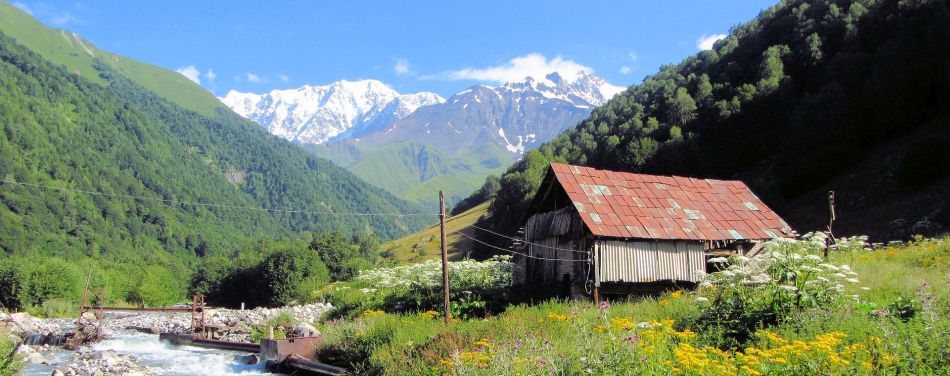
We had a great night’s sleep, only once were awoken by shooting. But there was no reason to worry. It has been a long time (understand - ten years) since Svaneti was a dreaded refuge of bandits. New road now leads into Mestia, heart of the region and in the area are rapidly growing guesthouses, hotels and prices.
We are camping close to Ushguli, highest occupied settlement in Europe. A new road has not yet made it here and I hope it will not anytime soon. The village is so far touristy just enough. There are a few guesthouses, two restaurants, small museum, more is not needed - most tourists come here just for a daytrip, to see ancient towers and enjoy the view of the mountains.
No surprise. Ushguli lies close to the spring of Inguri river and offers great views of main Caucasus ridge including Shkhara, highest Georgian peak. Thats why I immediately after wake up rush out of the tent to check the surroundings. Clear sky, mountains can be seen - perfect idyll.
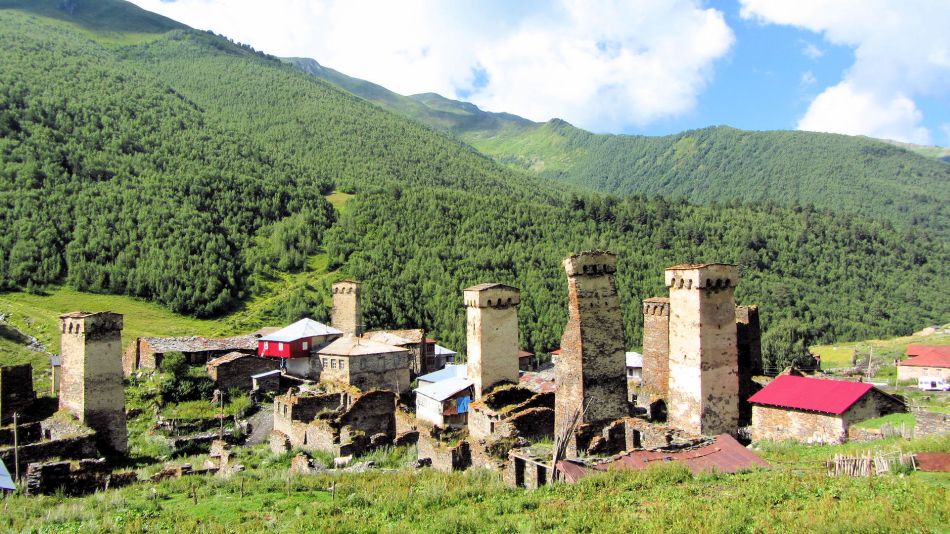
Ushguli
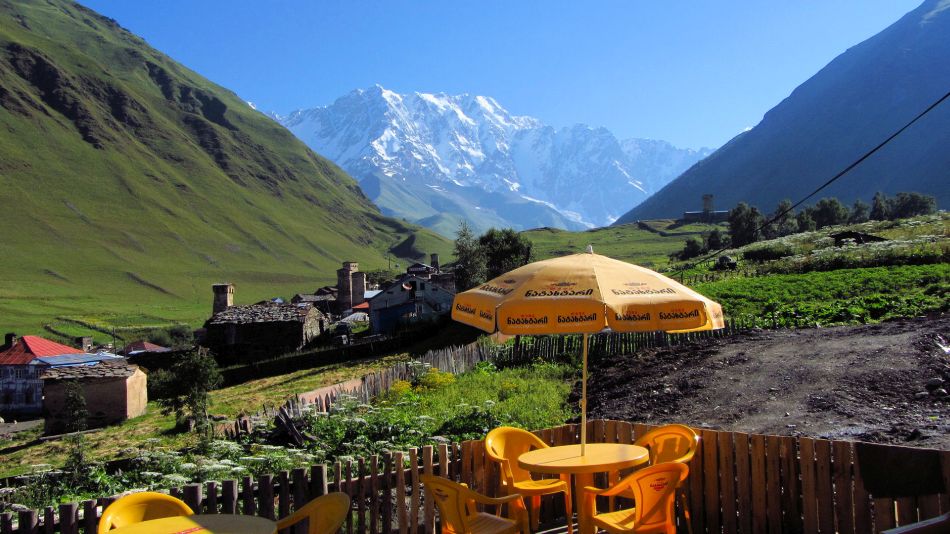
Ushguli with Mt. Shkhara in the background
We pack out tents and return to the village - arranged guys with horses already wait for us by the inn. For a long time they speculate, how to attach our backpacks onto baggage horses, it’s obvious they don’t do it very often. After half an hour, they finally succeed with the help of an improvised system of strings.
I climb into a saddle little nervous, I still didn’t get over horrendous experience I had in Tusheti last year. We slowly depart to the east. Our guide easily keeps pace with us on foot, as our horses are quite lazy. We try to urge them into trot several times, but they ignore our cautious commands and trudge forward with their own speed.
We ride through a beautiful valley - on the right, behind the mountain stream is towering Svaneti massif, separating Upper Svaneti from the Lower. Our road connects these two regions, but it’s in a terrible state and there is just a minimal traffic. Only a few jeeps passed us during the whole day.
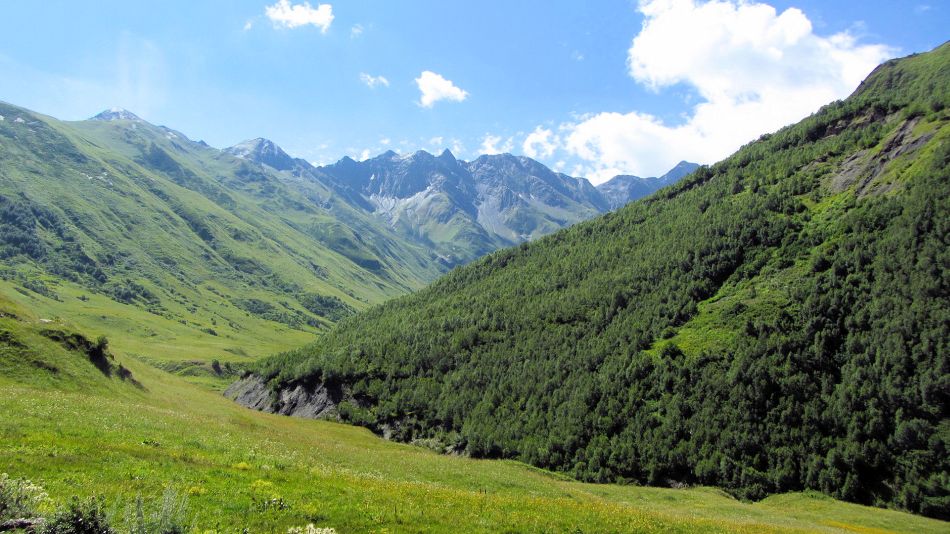
Svaneti massif
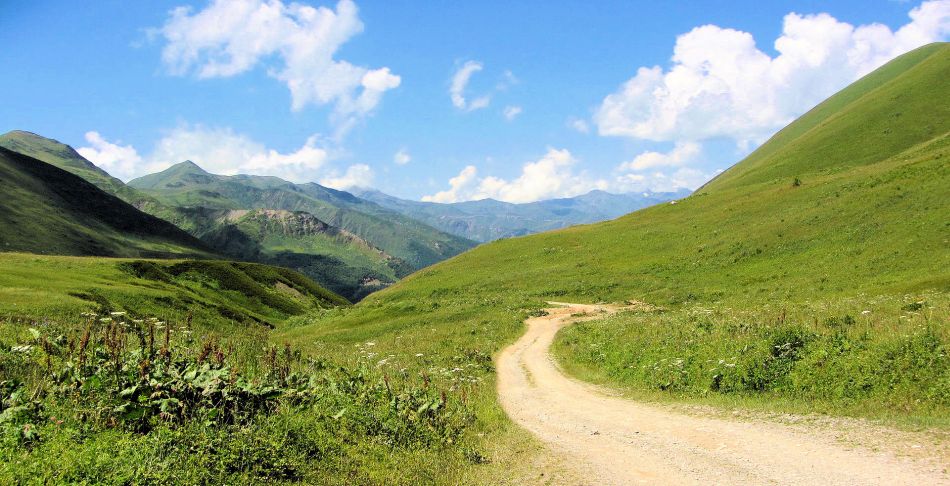
Looking back
The worst about the whole trip are horseflies. They are large, numerous and their bites draw blood. With merciless regularity they pick just that part of leg right above the sock, which I cant reach properly, as if they knew, that on a horseback I couldn't afford to try some major acrobatics. Even regular slaps don’t work on them, they just shake it off and fly away, I have to seriously smack them.
Shortly after noon we finally reach Zagar pass. Guide with horses turns back to Ushguli, we put on backpacks and carry on foot. We have a great view of the main Caucasus ridge, which bends here to the south - its dominated by 4000 meters high peaks Ailama and Tsurungali. As we gradually descent into the valley, vegetation changes. Even uphill grew pretty high grass, but here the road leads through an absolute jungle. Most impressive are 4-meters high hogweeds, but also other weeds don't lag too far behind.
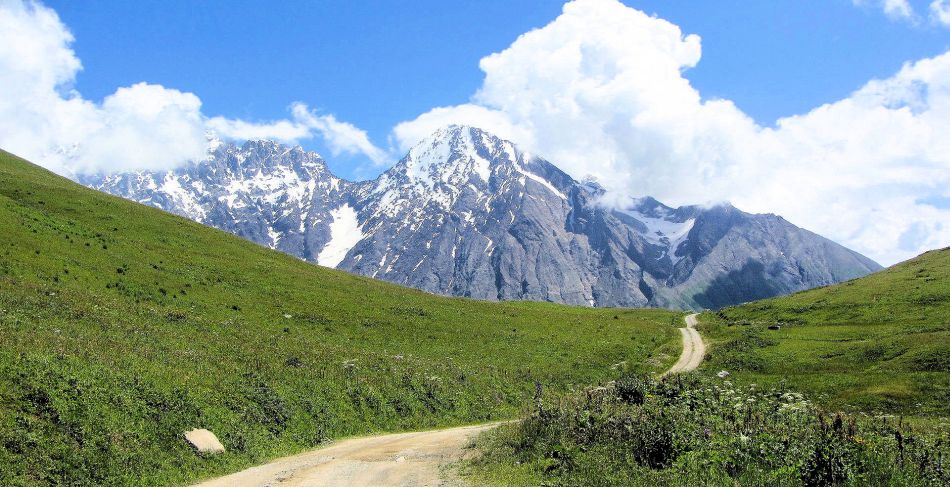
Ailama and Tsurungali
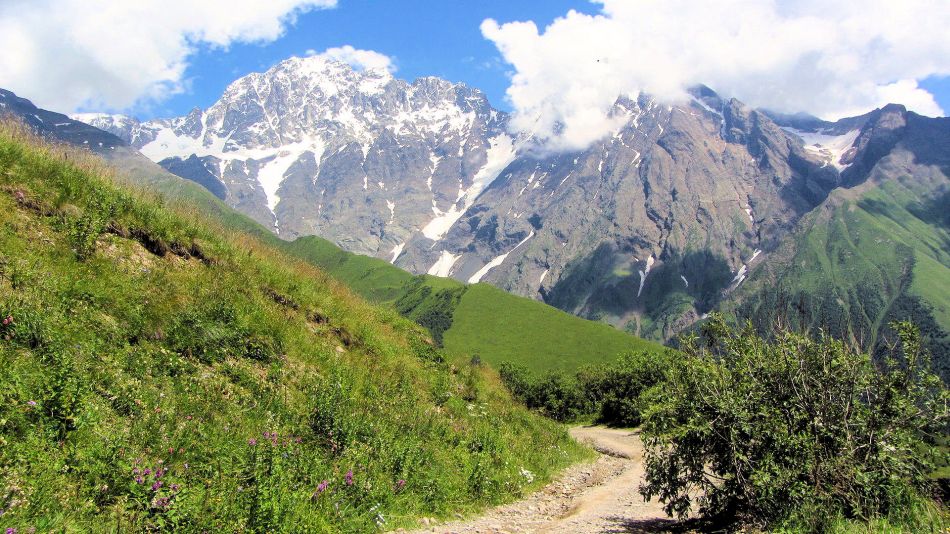
Into the Koruldashi valley
Towards us walks a party of three men. No surprise - Czechs. We address them, ask them, where they came from.
“From Racha.”
“Great, that’s where are we heading.”
Czechs start to grin. “Oh, really? Then we wish you good luck..”
I pull out a map. Czechs colorfully describe wading through a green jungle and keeping balance on steep slopes, I watch faces of my friends and feel, that this year there will be no trek to Racha. The path is not used and overgrown, we knew that. But we couldn’t imagine, how much can things here “get overgrown”.
Czechs leave us with words: “If you have time for that, you should definitely try it. It is a true, romantic wilderness, which nowadays can’t be seen just anywhere.”
We carry on walking a bit dejected. Heart would like to go, but logic says otherwise. We have a girls with us and crossing, which according to online info was supposed to take 2,5 days took experienced Czech trekkers four days. Noone wants to persuade those hesitating and then be responsible in case that something goes wrong. Even I lost a lots of enthusiasm for Racha trek. I like active vacations, but it doesn’t have to necessarily include endless roaming in 3-meters high weeds.
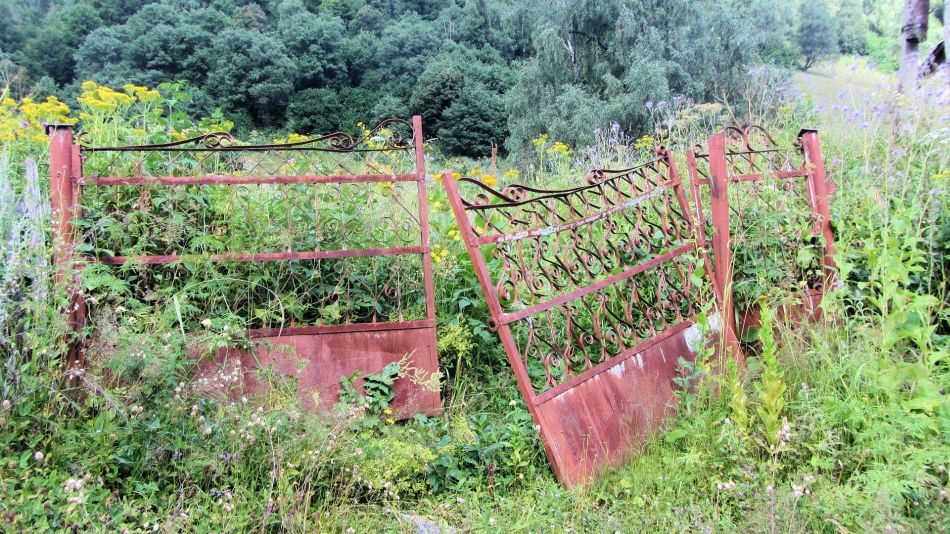
Abandoned farm
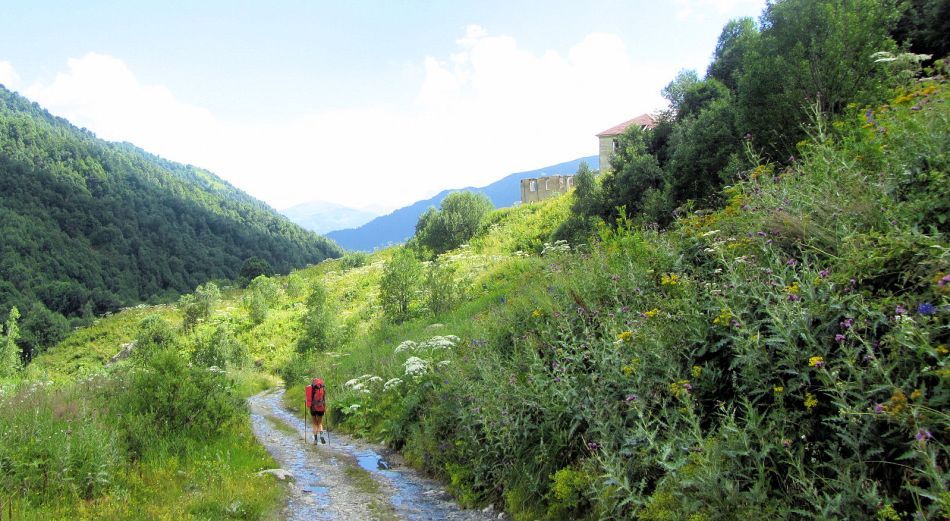
Valley of Koruldashi
By the road appear the first houses, abandoned and overgrown. We walk by Koruldashi river. Even though the river merrily gurgles, it’s actually dead. Near it’s spring lie remains of a factory for extraction and processing of arsenic, built by Soviets. It’s been closed since long time ago, but heaps of unprocessed toxic waste, which were left behind irreversibly poisoned groundwater.
Towards us pedals a pair of bikers followed by two dogs. One of hounds halts by us, sniffs, thinks for a while. Smell of our bacon and unwillingness to clamber up into the pass win and suddenly we have a companion.
That was our first encounter with semi-captive Svan dogs. They have no master, guard no herds. They accompany tourists, for a bit of food scare away bears and calm down their overly motivated shepherds brethren. Even though they invoke respect, they are mostly very friendly. But fidelity means nothing to them - they have their own brains and as suddenly as they emerge they can also disappear.
Behind the river appears a cluster of houses - Tsana village. Czechs mentioned that one house is still inhabited, so we go to check it out. We cross the bridge and then go further into the center of the village, where we find small flat spot with the cooking hole in the middle and old lady nearby. Her name is Nino. We lay on the grass and find out, that we actually don´t want to carry on. Originally we wanted to make it to Zeskho today, but we are not going to cross into Racha, so it would be pointless. Someone takes of his shoes and it´s decided. We are already measuring ground for our tents when Nino speaks up that if we want, we can sleep in one of the abandoned houses. Great!
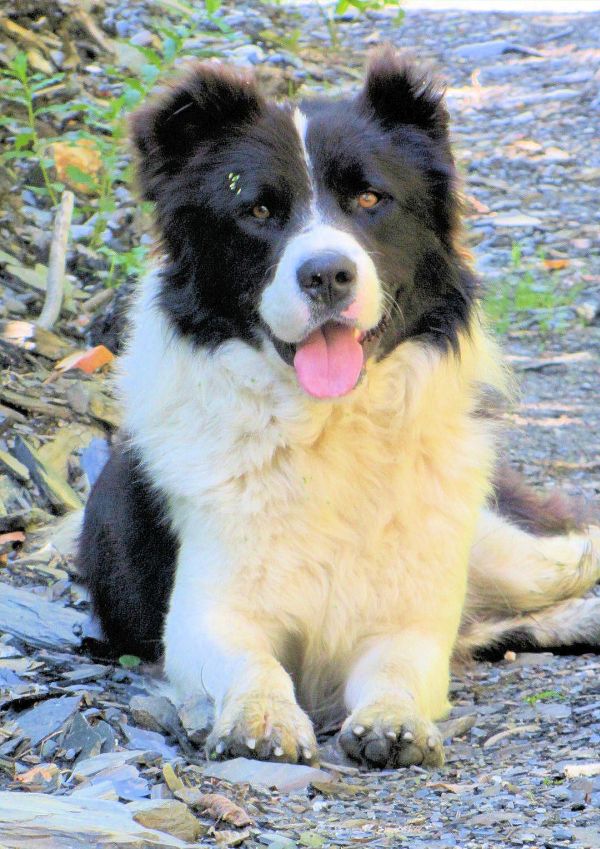
Our dog Beso
Our house is bit off the main road. Its ground floor is drowned in weeds so we live on the first floor where is a spacious terrace, several locked doors and one unlocked. It leads into big room, our sleeping place.
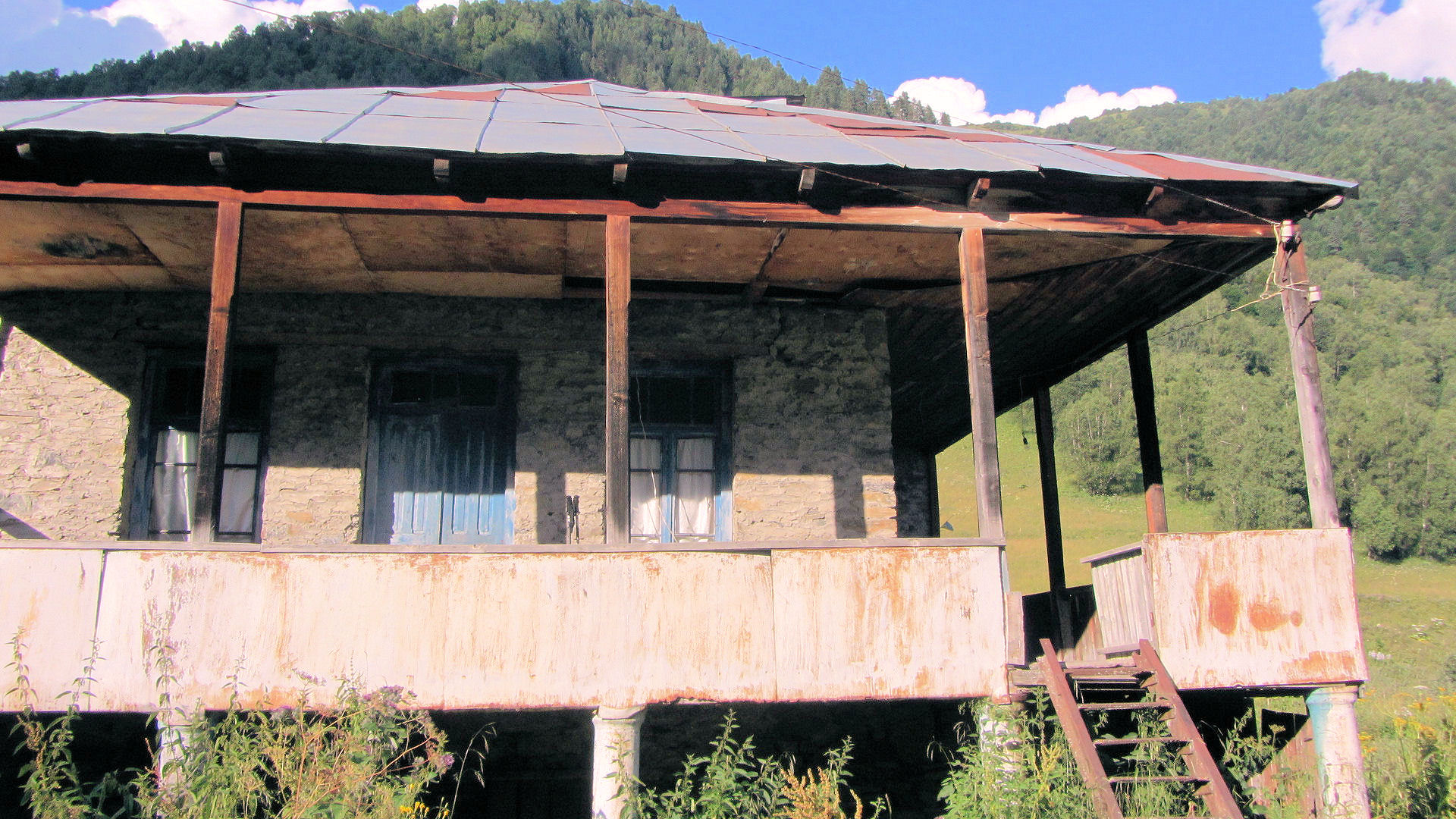
"Our" house in Tsana
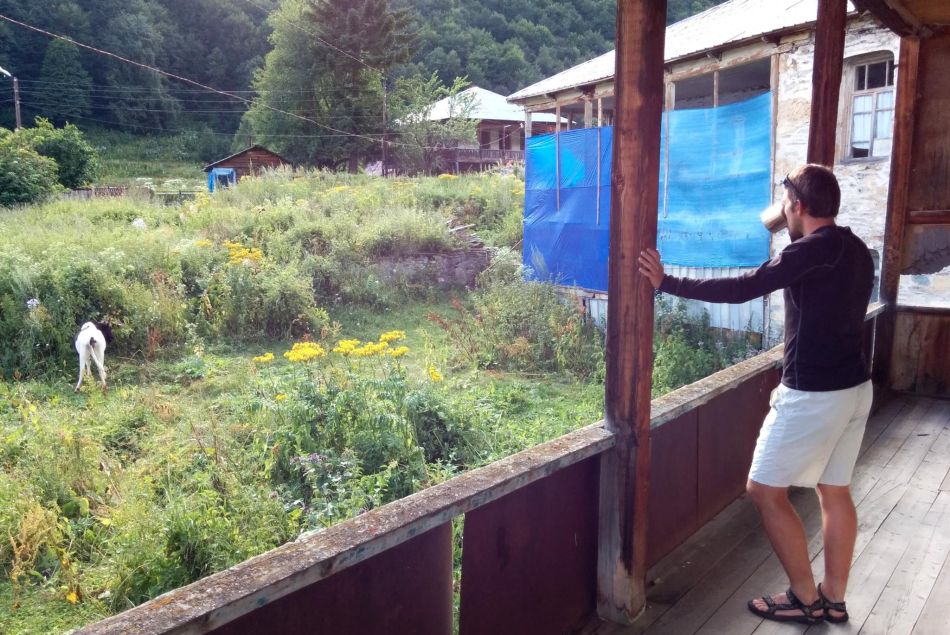
On the terrace
While walking to the spring I notice that here lives more people than we expected. There is a group of hunters and married couple, which runs “hotel” in one of the houses. Nino has here her husband Vitaly and several grandchildren on vacation. One of them, circa 10 years old boy is just wading through the weeds towards the river. He happily waves me with one arm, then swings with the other and I watch big sack of garbage flying through the air and disappearing in the rapids. Smile freezes on my face and I have a strong urge to grab boy by the collar and send him right after that garbage. But naturally I do nothing, they are here at home.
We cook the dinner at the terrace. We speculate what to do on the next day - we don’t want to return into civilization yet and plan day trip without backpacks towards that cursed Racha. Then comes Svan guy and gives us a bottle of chacha, as a welcome drink.
We naturally can’t let it like that, so we take a bottle of Becherovka and go to return a favor. On the grass spot, where we planned to camp in the meantime gathered the whole village, they are eating and drinking. We get a hearty welcome, beer, chacha, watermelons and I feel very pleasantly. Locals speak about life in the village. It is not inhabited permanently, locals have houses at the foots of the mountains and return here only for summers. They abandoned the village after tragical winter in 1986, when snowfall reached 10 meters and subsequent avalanches ruined villages in the whole valley. Some people spend here whole summer, others come here only for a few days, to hunt. Second groups forms a majority by the fire, on the next day their are returning to Tbilisi.
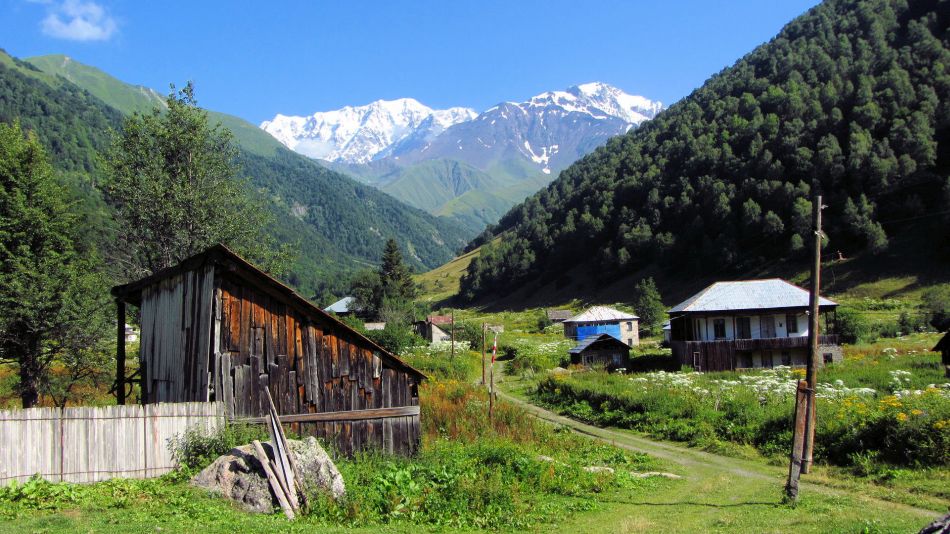
Tsana village
When I start feeling boozy and our girls have already seen all photos of hunting trophies, Viktor pulls out the flute and classic cultural enrichment begins. We make a strong start, Na Kráľovej holi and Tota Heľpa. Svans respond with their songs. In comparison with ours are more tender and subtle. They don’t have as strong main melody, but many nuances and finesses. Some songs they sing in polyphony, others have man’s and woman’s part - then sings only “Don Vito” and Nino and others reverently listen.
But we also don’t stay behind, chacha takes its toll. Often off key, but with even greater enthusiasm we sing songs I haven’t even thought I remember. No Slovak region is spared, we take them one by another. When we have a feeling that we have exhausted our repertoire, last great hit comes to our mind - Shepherd sitting by the fire. Also Svans like it a lot and sing chorus with us …. plem, plem, plem, plem.
Georgians suddenly get serious, stand up, put their hands on their hearts and start singing. We hear a word Sakartvelo several times - so that’s an anthem. We sing ours in return, say farewell and walk towards our sleeping bags and tough morning...













